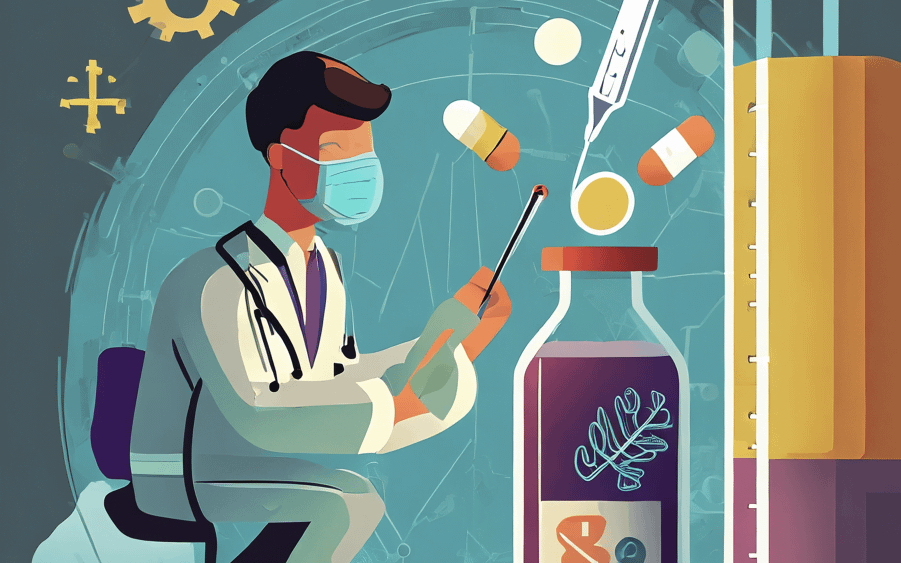Table of Contents

What is genetic testing exactly?
The medical industry uses this technique to find changes in genes, proteins, and chromosomes. Given the degree of risk involved, this is an extremely private and consenting procedure. Care can be provided to those who have a hereditary hazard using this therapy approach. Additionally, the procedure displays any DNA variation or mutation, which facilitates the detection of undesired disorders. There are various types of gene testing techniques, including:
- Genetic testing, such as sequencing of the genome and exome.
- When faced with potentially fatal illnesses, such as breast and colon cancer, panel testing is used.
- Patients with sickle cell anaemia undergo single gene testing.
What justifies the need for genetic testing?
- A prerequisite to examine whether any genetic or inherited disorders exist
- When certain genetic conditions manifest symptoms in children
- To serve as a guidance for the treatment of illnesses like cancer
The applications for this process are also crucially important. Let’s quickly review them:
- Prenatal testing: It is the procedure of examining the chromosomes of the foetus within a pregnant woman before the baby is delivered. It not only helps identify the gender of the infant but also enables the determination of any genetic defaults in the youngster.
- Newborn screening: Using this approach as soon as the child is born allows for the early detection and treatment of any genetic problems that may be affecting the child’s health.
- Forensic screening: In the criminal sector, this is a standard procedure used to ascertain the specifics of the accused.
- Diagnostic screening: It is carried out when a person displays certain symptoms that call for an urgent diagnosis.
- Predictive screening: Typically, it is carried out to find gene mutations that develop later in life.
- Carrier screening: The purpose of this is to ascertain whether the person carries a gene for a certain genetic condition.
- Pharmacogenomic screening: The purpose of this genetic screening is to determine whether or not a certain medication would be appropriate for the individual.
Diagnostic Testing
The majority of people who go through this process have shown symptoms during screening. To make sure the patient’s apparent symptoms do not point to a genetically caused illness, diagnostic testing is performed. These are the most suitable examples of non-invasive diagnostic tests which make use of extremely advanced diagnostic tools . The major types of diagnostic testing are:
- X-rays
- MRI (Magnetic Resonance Imaging)
- Ultrasound
Predictive genetic testing
People who are asymptomatic undergo this kind of genetic testing in an effort to identify a possible treatment or cure for the underlying illness. Both the patient and the patient’s family feel encouraged by these tests that the illness may be treated.
Carrier genetic testing
Especially in the present day, this is one of the most popular kinds of genetic testing. By using this test, a gene that might encode a potential disorder can be detected. This screening could be helpful in determining whether the unborn child has a particular genetic disorder, when the child is in the mother’s womb.
Testing for pharmacogenomics
This test’s primary goal is to provide information regarding how well a medicine fits the patient. The genetic testing gives the medical professional the ability to assess if the medication being prescribed is beneficial to the patient’s health. This emphasises even more how important genes are to the production of drugs.
Genetic testing provides an in-depth understanding of the role genes play in the pharmaceutical industry, making it an essential component of the healthcare sector. By its implementation, this technology has saved many lives and assisted in the diagnosis of numerous ailments as well as the discovery of new ones. Major uses for different types of genetic testing include:
- It is widely used to detect faulty genes in unborn children.
- It is practised to diagnose certain genetic disorders.
- Genetic testing is used for gene sequencing for the purpose of chemotherapy drugs.
- In cancer cases, this is also utilised to find the presence of a tumour.
- To determine whether there is a family history of any genetic disorders.
Prevention of diseases
Once the genetic condition is identified or tracked down, genetic testing can help avert a large number of deaths. After the nature of the illness is known, scientists focus on its mechanism of heredity or transmission and find new medications or therapies to improve the condition of the patient. Pharmacogenomic testing has made it possible for doctors to treat a number of hereditary disorders that were previously thought to be deadly.
Personalised treatments
Patients can now receive customised medication that takes into account their genetic makeup thanks to genetic testing. As a result, the conventional method of registering drugs for certain illnesses has been discontinued. Therefore, as pharmaceutical personalization has become more apparent in the larger picture, the potential for improvement has grown.

The ethical concerns in genetic testing
While there is no denying that this technology has expanded the possibilities for the medical field, it is crucial to balance the benefits with ethical considerations.
- The patient’s consent is a non-negotiable requirement for the testing.
- Counselling should be given to the patient who is undergoing tumour testing and has been found to have cancer.
- There should be restrictions on prenatal testing because it gives people access to assisted reproductive technologies.
- Genetic default information needs to be treated with extreme confidentiality.
Cost and accessibility:
Depending on the number of tests conducted, the cost of genetic testing might range from $100 to $2000. From the day of sample collection, the test results take a few days to come in.
There are several podcasts and articles that provide detailed information regarding the topic.
Conclusion
A comprehensive understanding of the function genes play in the pharmaceutical industry is provided by genetic testing, which is an essential component of the healthcare sector. Through its application, this technology has assisted in the identification of novel ailments, the detection of various disorders, and the saving of countless lives.Genetic mutations and modifications brought on by traditional techniques of introduction have been linked to a number of diseases and ailments. This has been totally eradicated through the use of genetic screening. Innovations in the pharmaceutical industry have replaced this amazing accomplishment.
Frequently Asked Questions
1.What cannot be detected in genetic testing?
Genetic testing does not reveal the disease’s symptoms. Using this procedure merely allows for the identification or discovery of the disease.
2. What are the advantages of genetic testing?
It has been demonstrated that this technology benefits the person by relieving them of the confusion around the issue at hand. Additionally, it gives patients hope for improvement in the event that a sickness is discovered. It gives the person a sense of hope and survival.
3.Are there any risks in genetic testing?
The process has essentially minimal risk. There are, however, some small variations of this technique, such as prenatal testing, which, depending on the circumstances, carries relatively little danger.
4.Will my insurance company provide coverage for my genetic screening?
This procedure is probably going to be covered by the insurance company



